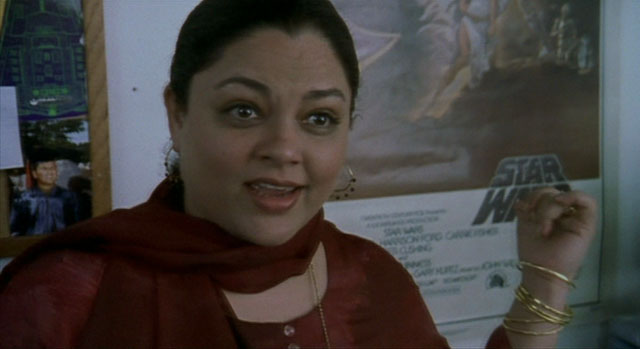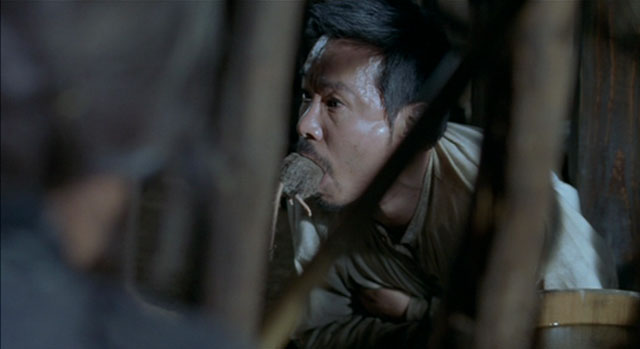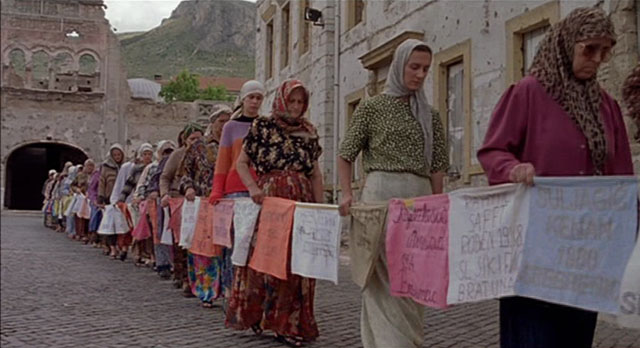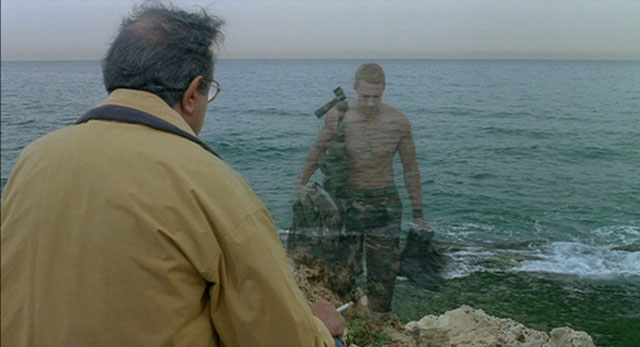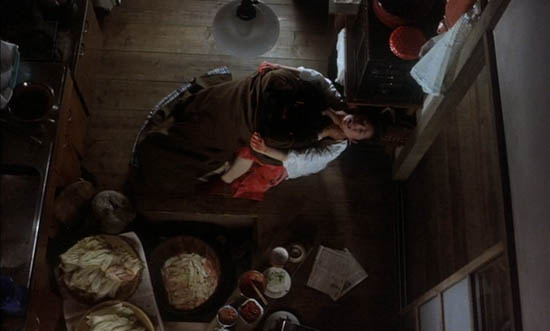“We, the Futori family, are the oldest family on the island. In recent years, our transgressions have caused trouble on the island, therefore, I now promise the gods that the Futori family will never go out to sea, and I will keep Nekichi in shackles. We will topple the rock and restore the paddy fields of the gods. Once we have made good our promises, please let us associate with the islanders again, please let us go out to sea again, and please let us participate in the Dongama Festival.”

What island? A primitive place, owned by Japan but left largely untouched until now, when industry is trying to creep in. What rock? The massive one desposited on the fields behind the Futoris’ house by a tidal wave. What transgressions? Nekichi slept with his own daughter because her husband wouldn’t, impregnated her, and even worse as far as the islanders are concerned, he was caught fishing with dynamite.
Nekichi with his father:

I actually lost track of how everybody was related – I know, an unforgivable crime in a family/incest film such as this. But I think I figured it out again. Grandpa Futori has two children, the chained Nekichi (Rentaro Mikuni, lead actor in the first segment of Kwaidan) and island priestess Uma (Yasuko Matsui, who runs the inn of In the Realm of the Senses).
Uma and Kametaro:

Nekichi’s father might also be his grandfather, and Nek’s two kids are the straightforward Kametaro (Choichiro Kawarazaki of Kurosawa’s Rhapsody In August) and retarded Toriko (Hideko Okiyama of Kurosawa’s Dodes’ka-den)
Things look up for the family when Ryu from the local sugar factory (Yoshi Kato of Double Suicide) hires Kametaro as assistant to a visiting engineer. But the engineer falls to the same fate as previous engineers, getting caught up in island life and derailed by sabotage (perpetuated in part by Nekichi, who slips out of his chains regularly). He also gets himself into an affair with daughter Toriko, whose heart is eventually broken when the engineer is sent away and replaced by a team that finally gets the work done.
Toriko makes a dream appearance before Kametaro’s train:

Nekichi, meanwhile, is having an affair with his own sister. They murder Ryu and escape by boat during the festival. Kametaro has finally been allowed to join, which means he must also join the search party that rows out to sea, bludgeoning his father to death and leaving his aunt tied to the mast.


What plot description and screenshots can’t convey is how awesome is this movie, a real masterpiece. It just maybe feels a tiny bit long at three hours, but comes together so well at the end, and is lovely to watch. Peppered with closeups of wildlife, like a more grotesque version of the Thin Red Line cutaways (or more relevantly, a less rampantly indulgent version of A Tale of Africa)

G. Kenny:
Every shot in Imamura’s film (which was lensed by Masao Tochizawa) is a feast of often-golden light. The film is set on the sun-drenched fictional island of Kurage (actually Okinawa, of which the fictional construct is merely a thinly disguised version), and the light here functions as a character, as does the water and all the other natural elements that surround the characters. The film’s narrative is nearly three hours of quintessentially Imamurian insanity, wryness, wisdom and acute anthropological observation.
Our narrator/storyteller:

J. Sharp:
By all accounts, Imamura found himself similarly seduced during the production process, embracing island life with a verve that saw the original shooting schedule expand from six to eighteen months, and the budget snowball accordingly. The film’s resulting commercial flop saw Imamura retreat from fiction filmmaking into television documentary for almost ten years, while the studio that financed it, Nikkatsu, migrated away from such ambitious projects to the low-cost/high-impact world of sex film production with the launch of its Roman Porno line in 1971.
The thin line that exists between man and beast remained a salient point of Imamura’s worldview throughout his career, notably in The Insect Woman, his first collaboration with the surrealist scriptwriter Keiji Hasebe … but seldom has man’s precarious position in the natural order of things been so scintillatingly evoked as here.



